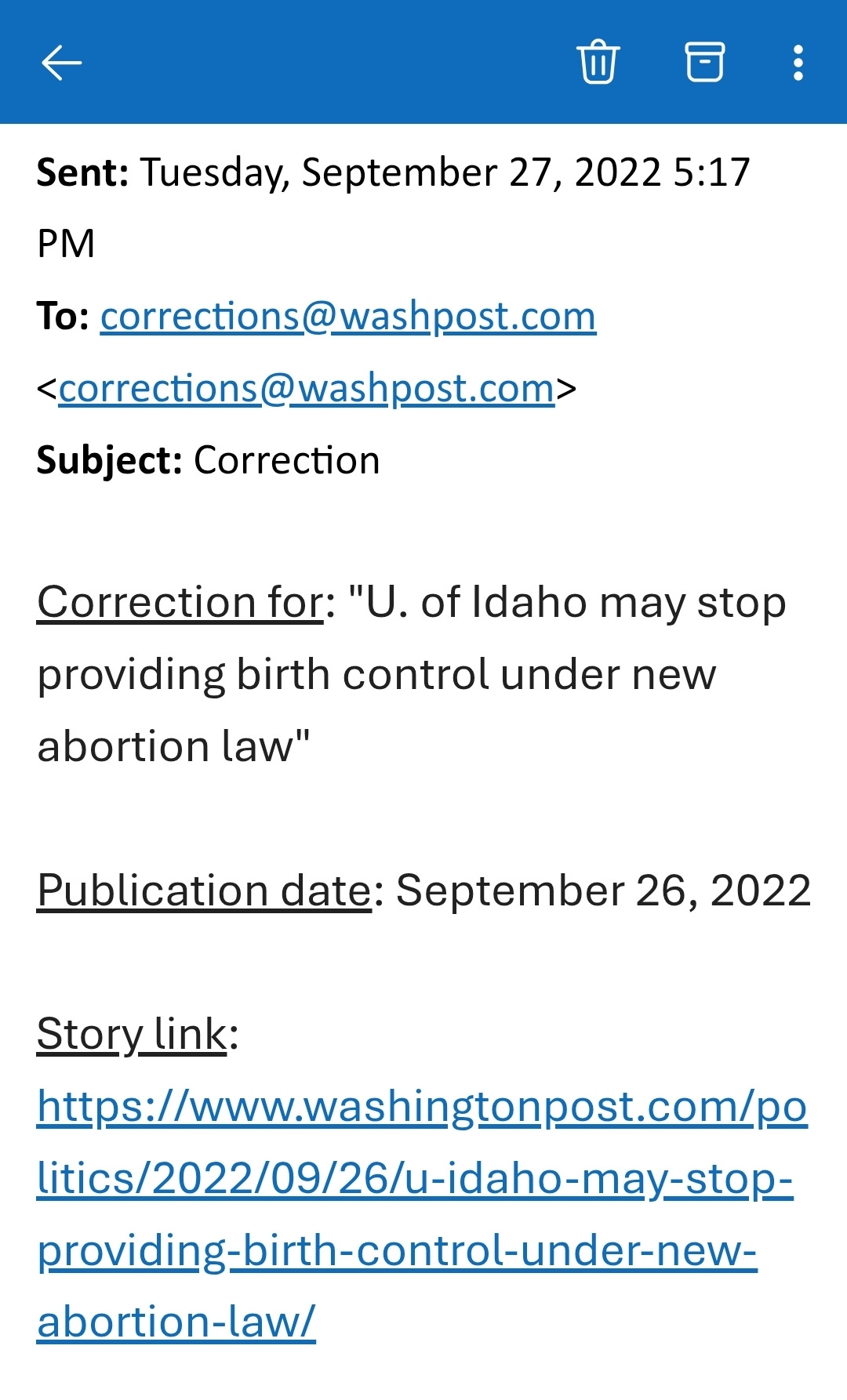Five ways mainstream press is failing us on repro health
Mainstream press often fail the public in a number of ways. Here are five.
This article is free to the public. Truthful information and insightful analysis should never be pay-walled, as freely accessible misinformation runs rampant. With every small donation, you ensure that the independent journalism at rePro-Truth remains freely available to all.
A few weeks after the Supreme Court's 2022 decision in Dobbs v. Jackson Women’s Health Organization, Democrats in Congress attempted to protect Americans’ right to plan their families by introducing the Right to Contraception Act. The effort was prompted by Justice Clarence Thomas's Dobbs concurrence in which he argued that the Court should also eliminate other Constitutional rights, as well as by the fact that more and more Republicans were calling for the overturning of Supreme Court precedent establishing Americans’ right to birth control.
When Congress introduced the Right to Contraception Act, anti-reproductive-rights groups panicked.
Having long been ideologically opposed to birth control, anti-contraception groups released a litany of statements against the Right to Contraception Act that, one after the other, attempted to mask their opposition to contraception in false (even hysterical) claims about the legislation.
(As the Contraceptive Access Initiative has noted, anti-contraception groups often claim that they do not take a position on contraception. This is deceptive. Many of these anti-reproductive-rights groups actively seek to reclassify the most effective forms of contraception as “abortion” by redefining pregnancy and through the rejection of medical science. The position of these groups is not neutral; rather it is actively hostile to contraception.)
The National Right to Life Committee (NRLC) lobbied hard against the Right to Contraception Act, falsely claiming that the bill “goes far beyond the scope of contraception” and “included[] abortion pills.”
SBA Pro-Life America falsely claimed the bill “seeks to bail out the abortion industry, trample conscience rights, and require uninhibited access to dangerous chemical abortion drugs.”
The Heritage Foundation falsely claimed that the bill “would preempt the Food and Drug Administration’s authority to regulate contraceptive drugs and devices.”
While the United States Conference of Catholic Bishops made their ideological opposition to contraception known, the USCCB's statement nevertheless falsely claimed that the bill would “render[] the Religious Freedom Restoration Act (RFRA) inapplicable.”
The House passed the Right to Contraception Act, but Republicans in the Senate, at the behest of anti-contraception groups, blocked its passage.
Just two months after anti-contraception groups and Republicans torpedoed the bill to protect Americans’ right to contraception, the Washington Post published an article titled, “U. of Idaho may stop providing birth control under new abortion law.” In the article, the Washington Post reporters wrote the following.
Leading antiabortion advocates have long held that they are not interested in restricting access to birth control. Kristan Hawkins, president of Students for Life of America, one of the country’s largest antiabortion organizations, said she doesn’t know of any antiabortion advocates who have called for birth control to be restricted on college campuses.
“We certainly have not called for that,” said Hawkins. While Hawkins would eventually support restrictions on some forms of emergency contraception, she said the movement needs to end abortion across the country first.
When I read this, I was aghast. Here were two well-established journalists not only misleading readers through negligent omission and uncritical both-sidesism, but also reducing themselves to mere stenographers by repeating the false claims of an anti-contraception leader, Kristan Hawkins.
And, excuse me, but on what planet does vociferous opposition to the Right to Contraception Act (just two months earlier) inexplicably indicate a lack of “interest[] in restricting access to birth control”? Hello—People who are truly disinterested in restricting access to contraception don't try to stop Congress from protecting Americans’ right to access it!
If you relied on the Washington Post for your news, you'd have been lead to believe that anti-reproductive-rights groups, chief among them Students for Life, are “not interested in restricting access to birth control.” You'd have had no idea that this could not be further from the truth. Dismayed, I submitted a correction to the Post.
“Washington Post readers deserve full factual information regarding the stances of those, such as Hawkins, who are interviewed,” I wrote to the Post.
In the email, I noted that “[o]n the Students for Life of America website, under Contraception, the group states it's official opposition to hormonal contraception and even non-hormonal copper IUDs, identifying their position as a part of their ‘mission [] to abolish abortion.’… In fact, Students for Life of America specifically emphasizes their opposition to contraception [as] a key issue (see the group's website post, Contraception Isn’t a ‘Side Issue’ and Here’s Why).”

I also pointed to a 2017 interview of Students for Life of America's prevaricating president, Kristan Hawkins, on MSNBC. When host Joy Reid asked if birth control should be legal, Hawkins said that hormonal contraceptives, including birth control pills and intrauterine devices, “should not be legal.” Hawkins followed up by then making several false claims about contraception.
In addition to linking to the video of the interview, I also linked to a 2017 article about the interview titled, “Anti-choice advocate admits to Joy Reid her ultimate goal is to make birth control illegal.” (You can watch the interview below.)
Additionally, I noted and included links to Hawkins's disinformation about and public advocacy against contraception, including against contraception access on college campuses (see here, here, here, here, here, and here).
The Washington Post never updated its article.
Five ways mainstream press is failing us on repro health
Although the above example occurred back in 2022, it perfectly illustrates the ways in which legacy media all too often fails us - all of us. In regards to sexual and reproductive health and (human) rights (*hereafter referred to as SRHR), mainstream press can fail the public in a number of ways. Here are five.
First, members of the press sometimes fail to weigh the accuracy of anti-SRHR activists’ and lawmakers’ various statements to the press by examining such statements against prior non-press-directed statements and actions which may prove contradictory to what a member of the press is being told during a particular interview. As Jessica Valenti has noted, the press too often take SRHR opponents’ words and framing at face value.
Second, members of the press sometimes fail to do their due diligence by neglecting to perform the research necessary to accurately understand and report on the tactics and language of SRHR opponents. This leads to negligently misleading coverage, often through the omission of relevant information beneficial to the public, as illustrated by the Washington Post article discussed above.
Third, members of the press sometimes fail to properly consider their own bias, naïveté, or disbelief, which can color the content and accuracy of their work and negligently mislead the reading public, as well as other members of the press. On a recent episode of the American Constitution Society's podcast Broken Law discussing Fetal Personhood ideology, abortion law historian Mary Ziegler noted the tendency toward naïveté and disbelief, leading to a failure to take anti-SRHR policymakers seriously. She observed, “I was really struck before Dobbs by how many people just didn't believe that Dobbs could happen. I think something similar is true with fetal personhood. There's a tendency to say this is just too extreme or this is a fringe movement when it isn't.” Also, Garnet Henderson has covered the issue of press bias and its bad habbit of both-sidesism. She has observed that, far too often, “[w]hen major media outlets do cover abortion, they often frame it as a political debate rather than as a human rights issue. And because they believe that they need to give space to both sides of that political debate, they end up giving anti-abortion extremists a platform and helping them to spread misinformation.”
Fourth, members of the press sometimes fail to consider the full scope of a particular subject, leading to a narrow-minded conceptualization and coverage of an important topic. For example, as rePro-Truth will show in the next post, the press (1) continually repeats the mainstream anti-SRHR movement's dishonest assertions that it does not support the punishment of pregnant people, and (2) perpetually conceptualizes punishment so narrowly that it focuses entirely on criminalization, to the exclusion of all other forms of punishment. Of note, even when focusing entirely on criminalization, decades of evidence show that the mainstrem anti-SRHR movement does, in fact, support criminalizing pregnant people.
Fifth, members of the press sometimes fail to recognize hostile actions by anti-SRHR groups as hostile, leading to errors in language and framing that treat overtly hostile actions as neutral. As the Contraceptive Access Initiative has noted, this is especially true for press coverage of contraception. As the group explains, at the heart of the problem “is how the media defines an attack on contraception. While extensive revisions to style guides about abortion coverage have proliferated in recent years, there is a paucity of guidance on contraceptive coverage.”
In the next article, we'll look at a few key examples illustrating the above ways in which the press often fails the public in its reporting on sexual and reproductive health and (human) rights, and in press coverage of those who oppose those rights.




